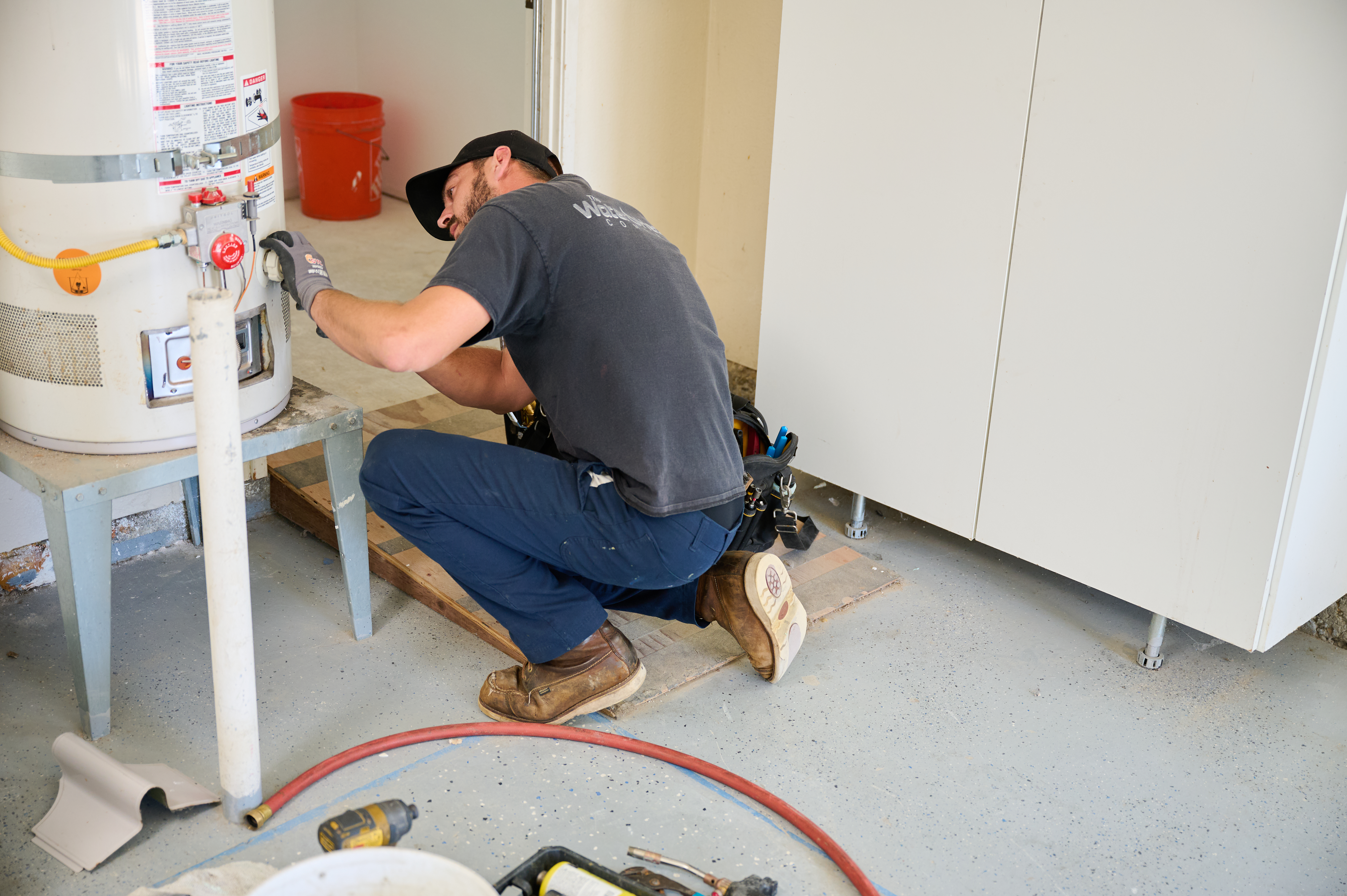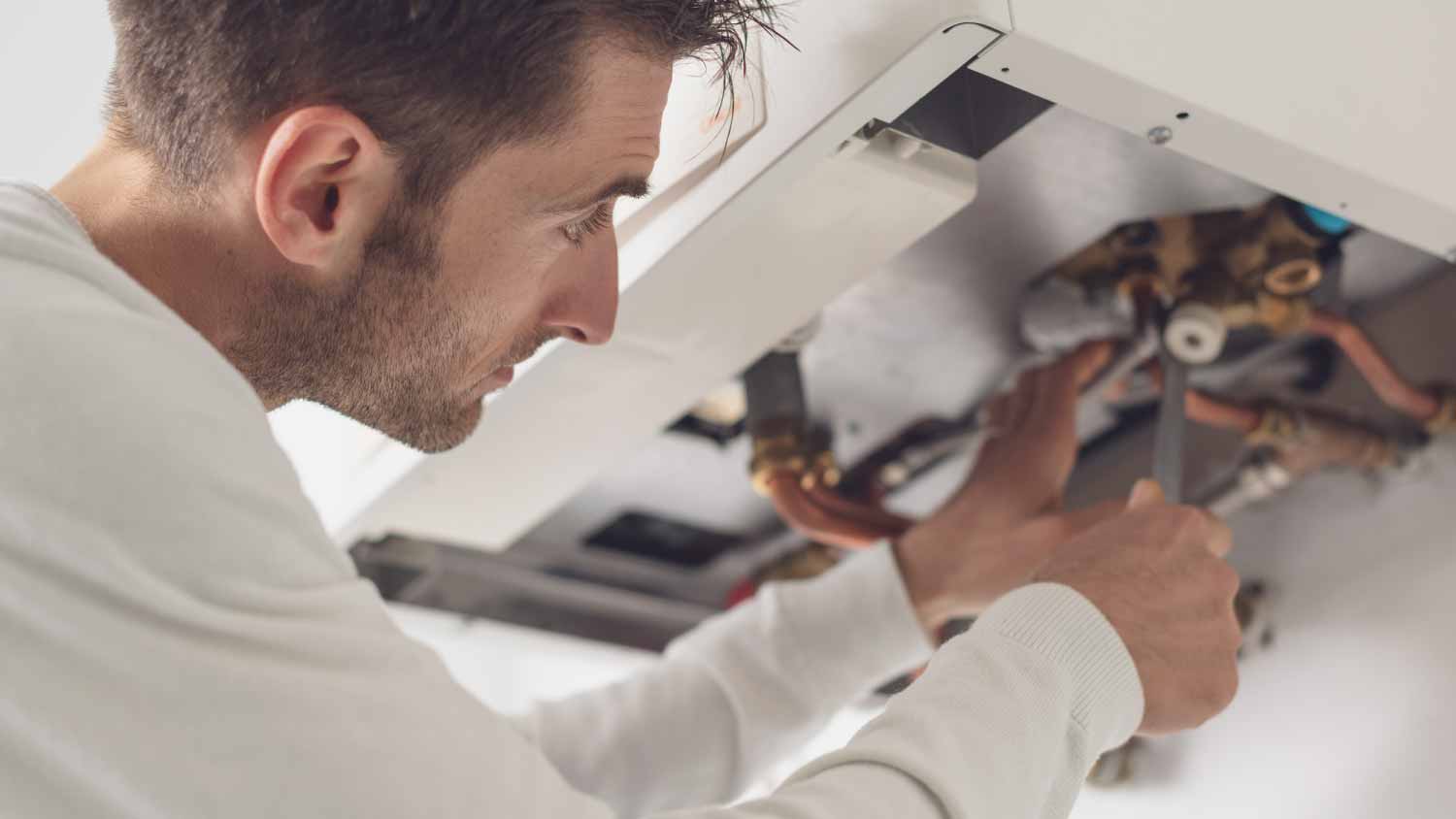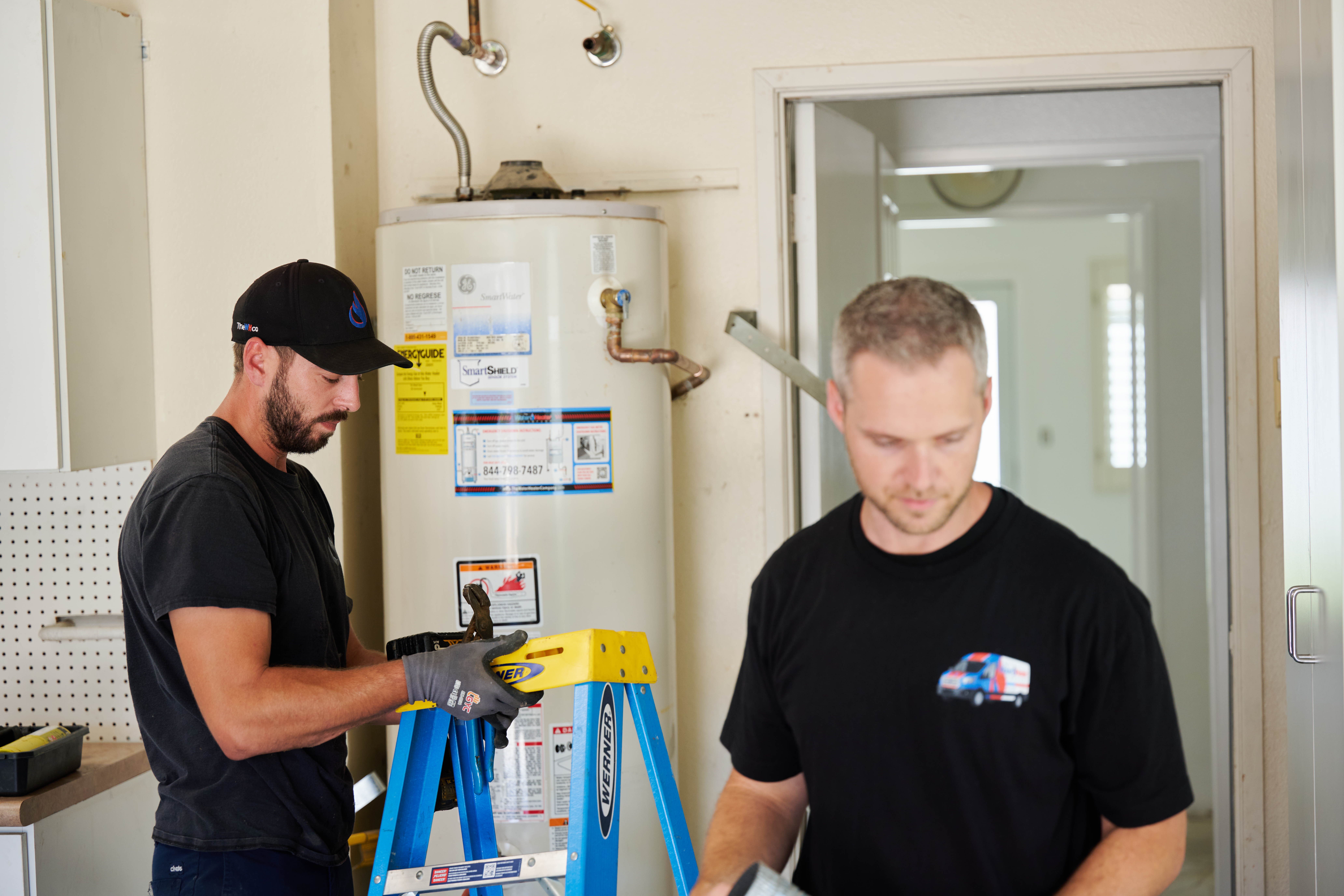
Tankless water heater costs depend on the size of your water heater, location, fuel type, and more. Keep reading to calculate your expenses.
Leaks don't wait… and neither should you


Most water heater leakage issues are best handled by the pros, ensuring the unit's safety.
Leakage from corrosion would require replacing the unit, which costs between $900 to $1,800.
Condensation on the top of the water heater is common—just wipe it away with a cloth.
Discovering a gas or electric water heater leaking from the top can be alarming, but when you identify the cause, you can take the right steps to fix it. A leak from the top of the unit requires prompt attention to prevent water damage and maintain the heater’s efficiency. We lay out six reasons your water heater is leaking from the top—but you may need to call a pro who fixes water heaters after you troubleshoot.

A temperature and pressure relief (TPR) valve is a brass, gold-colored device attached to the top side of your water heater tank that regulates pressure. If there's too much pressure inside the tank, the TPR valve will release pressure and leak water. A faulty or corroded TPR valve that needs replacing is another issue that can cause leaks from the TPR valve.
Inspect the TPR valve for signs of corrosion or looseness. If you suspect that the TPR valve is the cause of the leak, shut off your water heater immediately to avoid risking an explosion. This indicates the TPR valve needs replacement, which is best handled by a local water heater pro. Even if this isn't the case, there could be another issue associated with the TPR valve that requires a professional diagnosis.
A cold water inlet valve manages cold water entering your water heater from the main supply, while a hot water inlet valve manages hot water entering from the main supply. A loose or deteriorated hot or cold water inlet valve allows water entering from the main water line to leak outside of the water heater.
Check the valves for signs of a leak to confirm this is the source of your water leaking. Signs of corrosion mean you'll need to replace the valve entirely. If there is no corrosion, check to see if either inlet valve is loose. You can tighten these inlet valves using a wrench. But if there’s still a leak after tightening with the wrench, you'll need to replace it.
Leaky pipes are common with any type of plumbing, including water heaters. Damaged, cracked, loose, or corroded pipe fittings or connections can cause leakage.
If your pipe fittings or connections are corroded and leaking, you may see water droplets around them. You'll need to replace the pipes entirely, which is best handled by a pro to ensure the right parts are used and installed correctly to avoid a bigger issue down the road.
The anode rod in your hot water heater prevents corrosion inside. However, if you don't maintain and replace it regularly, the rod can become compromised. Corrosion can cause the anode rod to bubble and leak water out of the port and through the top of your tank.
Replace the anode rod to prevent the port from leaking water. This keeps water where it belongs and protects the inside of your tank from corrosion. Left unattended, corrosion can lead to water heater repair costs, which range between $230 and $990, or even replacement costs down the line.
Corrosion is a hot water heater’s worst nightmare. Rust can eat away at the tank from the inside of your unit or from the outside if rainwater enters and settles on top of your hot water heater and you don't remove the water. If you don't keep up with water heater maintenance, corrosion can work its way through your tank and create leaks that require a replacement unit.
If you see corrosion, rust, or holes in your water heater tank, the only way to solve this problem is to invest in a new water heater tank unit. The cost of replacing a water heater is between $900 and $1,800. To safely install the new water heater, reach out to a pro instead of attempting to DIY it.
Sometimes, there isn’t a problem with your water heater at all. Condensation or a collection of rainwater could be to blame. Condensation occurs when cold water enters the piping, and your water heater starts to heat it. Water heaters naturally produce water vapor and condensation on the outside of the unit. Though they may seem concerning, condensation and rainwater are not problematic.
Rule out other problems before deciding that it's just a matter of condensation or rainwater. Rainwater on top of your hot water heater should be wiped after the storm to protect the exterior of the water heater from corrosion. If you see condensation, you can wipe that off too but don't need to take any further action.

While fixing condensation or rainwater on the top of your water heater can be an easy task for any homeowner to handle, most of these issues require hiring a water heater pro near you. Issues like a faulty TPR valve, damaged inlet valves, or corroded pipe fittings can be complex and, if not handled correctly, may lead to more severe leaks, water damage, or safety hazards.
For example, if corrosion is present on top of the unit or around the anode rod port, an expert can assess it. They'll tell you whether repairs are sufficient to extend the water heater's lifespan or if replacement is a better long-term solution. On average, a hot water heater lasts between 8 and 12 years for a conventional heater and up to 20 years for a tankless model.
Routine water heater maintenance and inspections can help you stay on top of any leaks. Periodically check the TPR valve, inlet valves, and pipe fittings for leaks or damage. Search for signs of wear, corrosion, or loose connections. Look at the anode rod for signs of rust, which could easily spread to other components.
Flush the water heater tank annually to reduce sediment buildup, which can cause corrosion and lead to leaks. The cost to flush a water heater ranges between $110 and $200. If you're a savvy DIY homeowner, you can learn how to flush a water heater or hire a pro to tackle the job.
From average costs to expert advice, get all the answers you need to get your job done.

Tankless water heater costs depend on the size of your water heater, location, fuel type, and more. Keep reading to calculate your expenses.

Learn about the different factors that go into water heater gas valve replacement costs to see if you should DIY the project or call a pro.

Tankless water heater costs in Chicago, IL depend on the size of your water heater, location, fuel type, and more. Keep reading to calculate your expenses.

How much do water heaters weigh? The answer depends on the type of water heater, its size, and several other factors. Read on to learn more.

Testing a water heater thermostat starts with shutting off the power and using a multimeter. Follow this guide on how to test your water heater thermostat.

The time it takes to drain a water heater varies by system. This article provides the details and explains what to do if your water heater is draining slowly.